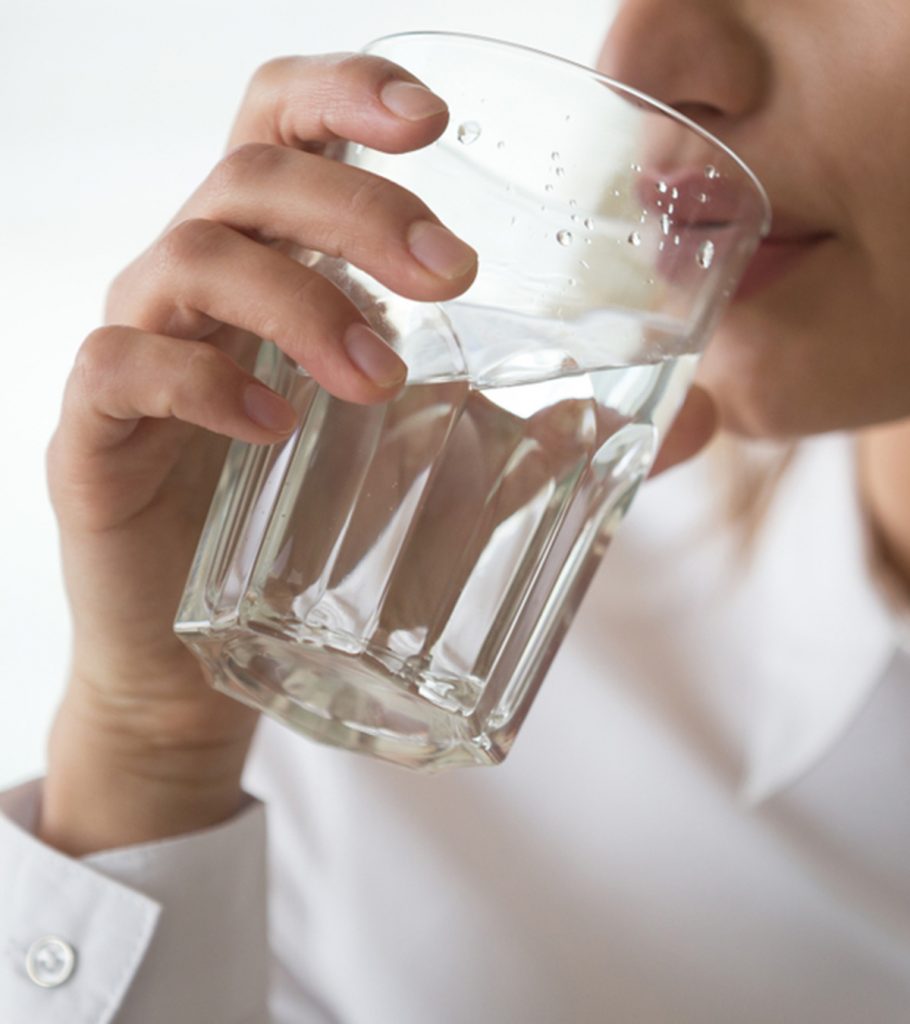If you are experiencing dehydration when breastfeeding, it can change the composition and quantity of breast milk. Low water intake and fluid loss can deplete the fluid levels in the body. In such cases, nursing moms are more likely to develop dehydration due to increased fluid demand. Mild dehydration may not affect the milk supply, but it is important to prevent severe dehydration. You need to take more water during breastfeeding to maintain the fluid levels in the body.
Read on to know the signs, causes, complications, and treatment of dehydration in breastfeeding mothers and ways to prevent it.
Can Breastfeeding Cause Dehydration?
The reduced intake of fluids while breastfeeding may cause dehydration. Nursing mothers were found to lose an average of 700 ml of water a day by eight weeks postpartum (1). Lactating mothers are thus recommended a required daily intake of 3.1 liters (13 cups) of water, which can help manage water loss from breastfeeding (2).
Make it a habit to drink a glass of water while nursing the baby, and have it after meals and other regular times. However, do note drinking extra fluids than the optimal requirement for postpartum hydration will not result in additional milk production. Therefore, if your thirst is quenched, then do not force yourself to drink more water.
Does Dehydration Affect Breastfeeding?
Severe dehydration may reduce milk production. However, this may not be a significant marker of dehydration while breastfeeding as other significant symptoms might surface even before the fall in milk supply. Usually, mothers seek medical care due to other symptoms and signs of dehydration before the reduction in the amount of breast milk.
Although exclusively breastfeeding mothers should consume additional fluids to maintain optimal hydration status, breastfed babies do not require extra water for hydration since 87% of breast milk is composed of water (1). Recommended formula feeds also meet the recommended fluid requirement to maintain optimum infant hydration.
Signs And Symptoms Of Dehydration When Breastfeeding
The signs and symptoms may vary depending on the severity. You may experience a range of symptoms from an increase in thirst to confusion.
The following signs and symptoms can be associated with dehydration (3):
- Extreme thirst
- Headache
- Nausea
- Dry mouth and lips (chapped lips)
- Dark urine and oliguria (decreased urine output)
- Constipation
- Tiredness or fatigue
- Dizziness
- Muscle cramps
- Confusion
- Rapid breaths and heart rate
- Hypotension (low blood pressure)
After a nursing session, dehydration may worsen, and a reduction in milk supply may lead to changes in infant feeding patterns, which can increase the risk of dehydration in your baby. Babies can become dehydrated sooner than adults.
Reflecting on her experience with dehydration during breastfeeding, Bailey Newman, a mother and vlogger, says, “When you are breastfeeding, you need to be drinking a lot of water. In the beginning, breastfeeding didn’t make me dehydrated. Yet, on one occasion, I was dehydrated to the point like I had the worst headache ever, I was very nauseous, all of the symptoms that you can feel from dehydration, I was feeling (i).”
You may consume more fluids and continue to breastfeed even when you are having diarrhea, vomiting, chronic illness, etc.
Risks And Causes Of Dehydration During Lactation
Any health condition that causes water loss from the body and reduced intake of fluids could cause dehydration in nursing mothers. The following factors could increase the risk or cause dehydration while breastfeeding (4).
- Excessive sweating due to climate, physical activity, or fever
- Continuous vomiting
- Diarrhea
- Common cold or flu
- Diabetes insipid us and other chronic diseases
Sometimes, dehydration can also cause breast engorgement. When a mother is dehydrated, their body may hold onto fluids to prevent further dehydration. This can cause the breast tissue and milk ducts to become congested, leading to engorgement.
Lactating mothers require more daily water intake than other women, and this may speed up dehydration. Hot and humid environments, not drinking enough water, and lack of clean water supply could also increase the risk of dehydration in nursing mothers.
Most of the conditions listed above could result in fluid and electrolyte loss from the body. Although mild dehydration can be corrected by drinking water, moderate and severe dehydration requires medical care.
Does Dehydration Affect The Baby?
Maternal dehydration may also cause dehydration in the baby. Breastfed babies can develop hypernatremic dehydration, which is a high serum sodium concentration in the blood due to reduced fluids, which may result in severe complications if effective treatments are not given on time (5).
When To Visit A Doctor
If you have symptoms of severe dehydration, such as fainting, muscle cramps, headache, etc.,then seek immediate medical care. You may require rehydration with intravenous fluids in a hospital setting. Seek immediate care if you have signs of dehydration along with vaginal bleeding in the postpartum period.
Early medical care can help avoid complications. Talk to your doctor if you have mild dehydration or continuous diarrhea or vomiting. Do not use over-the-counter rehydration solutions without your doctor’s advice.
Treatment For Dehydration In Nursing Mothers
Your doctor may start rehydration therapy after assessing symptoms and physical examination. Blood tests and urine tests are often ordered for confirmation and to identify the level of electrolyte loss.
Rehydration therapy is the treatment for dehydration. It is the replacement of lost electrolytes and fluids from the body (6). The intensity of rehydration therapy is decided depending on the fluid loss. Mild dehydration can be corrected with oral rehydration solutions.
Severe dehydration requires intravenous (IV) fluid correction to hydrate. Most people recover quickly after dehydration treatments. Your doctor may also prescribe medications to treat the underlying cause, such as diarrhea or vomiting. Taking oral rehydration solutions (ORS) or electrolyte powders without doctor’s advice is not recommended to prevent dehydration.
If your breastfed baby is dehydrated, then they will also receive rehydration therapy in the emergency room.
Tips To Prevent Dehydration During Breastfeeding
Sometimes, new mothers forget to drink adequate fluids while putting the needs of little ones above theirs. However, you need to stay hydrated while breastfeeding to ensure yours and your little one’s good health.
The following tips may help reduce the incidence of dehydration in lactating mothers.
- Make sure you have a full water bottle nearby to drink throughout the day. Always keep clean and safe water handy. Purified water and bottled water can reduce the chance of water-borne diseases.
- If you often forget to drink water, then set an alarm or use some hydration apps to remind you.
- Consume high water content foods, such as yogurt, soups, salads, cucumbers, watermelon, etc. These foods may help you stay hydrated without adding a lot of extra calories.
- You may add lemon juice or a small amount of fruit juice to make water more palatable.
- Avoid caffeinated and sugary drinks, such as coffee, soda, or tea. These may cause dehydration due to diuretic effects (7).
You may experience immense weakness and tiredness due to dehydration when breastfeeding. If you have been trying to avoid breastfeeding to reduce dehydration, you must know that it’s not a sustainable way of taking care of it. It is essential to consume a regular amount of water daily. However, if you continue to experience dehydration, you must consult a lactation expert. Ensure that you and your baby get the correct nourishment and stay hydrated. You can examine your hydration level by observing the color of the urine.
Key Pointers
- Dehydration during breastfeeding is often caused by chronic illnesses, high perspiration, and frequent vomiting and diarrhea.
- Severe dehydration during breastfeeding may impact the content and volume of breastmilk.
- Extreme thirst, headache, nausea, and muscle cramps are symptoms associated with dehydration.
- It is advised that lactating mothers drink 3.1 liters (13 cups) of water each day.
- Consuming foods high in water content, fluids, and avoiding too much caffeine can help prevent dehydration while breastfeeding.
As a breastfeeding mom, it’s important to stay hydrated. Learn the top signs of dehydration and how to stay healthy!















